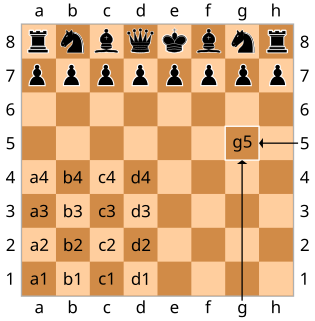| Look up forfeit , forfeiting , or forfeiture in Wiktionary, the free dictionary. |
Forfeit or forfeiture may refer to:
| Look up forfeit , forfeiting , or forfeiture in Wiktionary, the free dictionary. |
Forfeit or forfeiture may refer to:
| This disambiguation page lists articles associated with the title Forfeit. If an internal link led you here, you may wish to change the link to point directly to the intended article. |

Algebraic notation is a method for recording and describing the moves in a game of chess. It is based on a system of coordinates to uniquely identify each square on the chessboard. It is now standard among all chess organizations and most books, magazines, and newspapers. In English-speaking countries, the parallel method of descriptive notation was generally used in chess publications until about 1980. Some older players still use descriptive notation, but it is no longer recognized by FIDE.

The rules of chess are rules governing the play of the game of chess. While the exact origins of chess are unclear, modern rules first took form during the Middle Ages. The rules continued to be slightly modified until the early 19th century, when they reached essentially their current form. The rules also varied somewhat from place to place. Today, the standard rules are set by FIDE, the international governing body for chess. Slight modifications are made by some national organizations for their own purposes. There are variations of the rules for fast chess, correspondence chess, online chess, and Chess960.

In chess, there are a number of ways that a game can end in a draw, neither player winning. Usually, in tournaments a draw is worth a half point to each player, while a win is worth one point to the victor and none to the loser.
In chess, a draw by (mutual) agreement is the outcome of a game due to the agreement of both players to a draw. A player may offer a draw to his opponent at any stage of a game; if the opponent accepts, the game is a draw. The relevant portion of the FIDE laws of chess is article 9.1. The vast majority of drawn chess games at the amateur club/tournament level and higher are draws by mutual agreement rather than the other ways a game can be drawn.
Confiscation is a legal form of seizure by a government or other public authority. The word is also used, popularly, of spoliation under legal forms, or of any seizure of property as punishment or in enforcement of the law.
In the sport of cricket, a declaration occurs when a captain declares his team's innings closed and a forfeiture occurs when a captain chooses to forfeit an innings. Declaration and forfeiture are covered in Law 15 of the Laws of Cricket. This concept applies only to matches in which each team is scheduled to bat in two innings; Law 15 specifically does not apply in any form of limited overs cricket.

In rem jurisdiction is a legal term describing the power a court may exercise over property or a "status" against a person over whom the court does not have in personam jurisdiction. Jurisdiction in rem assumes the property or status is the primary object of the action, rather than personal liabilities not necessarily associated with the property.
An innocent owner defense is a concept in United States law providing for an affirmative defense that applies when an owner claims that they are innocent of a crime and so their property should not be forfeited. It is defined in section 983(d) of title 18 of the United States Code and is part of the Code that defines forfeiture laws and more specifically the general rules for civil forfeiture proceedings. It states that the "claimant shall have the burden of proving that the claimant is an innocent owner by a preponderance of the evidence."

Asset forfeiture or asset seizure is a form of confiscation of assets by the state. In the United States, it is a type of criminal justice financial obligation. It typically applies to the alleged proceeds or instruments of crime. This applies, but is not limited, to terrorist activities, drug related crimes, and other criminal and even civil offenses. Some jurisdictions specifically use the term "confiscation" instead of forfeiture. The alleged purpose of asset forfeiture is to disrupt criminal activity by confiscating assets that potentially could have been beneficial to the individual or organization.

Ivan Cheparinov is a Bulgarian chess grandmaster. He is a four-time Bulgarian champion. Cheparinov competed in the FIDE World Cup in 2005, 2007, 2009, 2015 and 2017. In 2018 he switched his national federation to Georgia.
UAAP Season 67 is the 2004–05 athletic year of the University Athletic Association of the Philippines, which was hosted by De La Salle University-Manila. The season opened on July 10, 2004.
Bennis v. Michigan, 516 U.S. 442 (1996), was a decision by the United States Supreme Court, which held that the innocent owner defense is not constitutionally mandated by Fourteenth Amendment Due Process in cases of civil forfeiture.

A chess tournament is a series of chess games played competitively to determine a winning individual or team. Since the first international chess tournament in London, 1851, chess tournaments have become the standard form of chess competition among serious players.

Ballot Measure 53 was a legislatively referred constitutional amendment ballot measure for the May 20, 2008 primary election ballot in the state of Oregon. The measure amended the Oregon Constitution and was narrowly passed by the voters after an automatically triggered recount was taken.

650 Fifth Avenue is a 36-story 150 m (490 ft) building on the edge of Rockefeller Center on 52nd Street in New York City.

The 1896 Tulane Olive and Blue football team represented Tulane University during the 1896 Southern Intercollegiate Athletic Association football season. The game against LSU of this year was forfeited during the game due to Tulane having fielded an ineligible player. At the time that the game was declared forfeit, Tulane was leading with a score of 2–0. Due to the forfeiture, the official score was set at LSU 6, Tulane 0 by the game's referee. In addition to the forfeiture, Tulane was further sanctioned by the SIAA by being barred from fielding a team in intercollegiate play for the 1897 season.
In various sports, a forfeit is a method in which a match automatically ends, and the forfeiting team loses.
Civil forfeiture in the United States, also called civil asset forfeiture or civil judicial forfeiture, is a process in which law enforcement officers take assets from persons suspected of involvement with crime or illegal activity without necessarily charging the owners with wrongdoing. While civil procedure, as opposed to criminal procedure, generally involves a dispute between two private citizens, civil forfeiture involves a dispute between law enforcement and property such as a pile of cash or a house or a boat, such that the thing is suspected of being involved in a crime. To get back the seized property, owners must prove it was not involved in criminal activity. Sometimes it can mean a threat to seize property as well as the act of seizure itself. Civil forfeiture is not considered to be an example of a criminal justice financial obligation.
Monopoly Millionaires' Club is an American game show that debuted in syndication on March 28, 2015. Hosted by stand-up comedian/actor Billy Gardell, best known for his role as Chicago police officer Mike Biggs on the sitcom Mike & Molly, it was initially based on an unsuccessful drawing game of the same name that was coordinated by the Multi-State Lottery Association (MUSL), using the Monopoly board game brand under license from Hasbro. The lottery game returned, in scratch-off form, in the spring of 2015.
In chess, the fivefold repetition rule was introduced by FIDE, the game's international governing body, in 2014. It states that the game immediately ends in a draw if the same position occurs five times, where the rule specifically defines when two positions are considered the same. The rule is similar to the threefold repetition rule, but the arbiter is required to enforce it regardless of whether or not a player has made a claim.